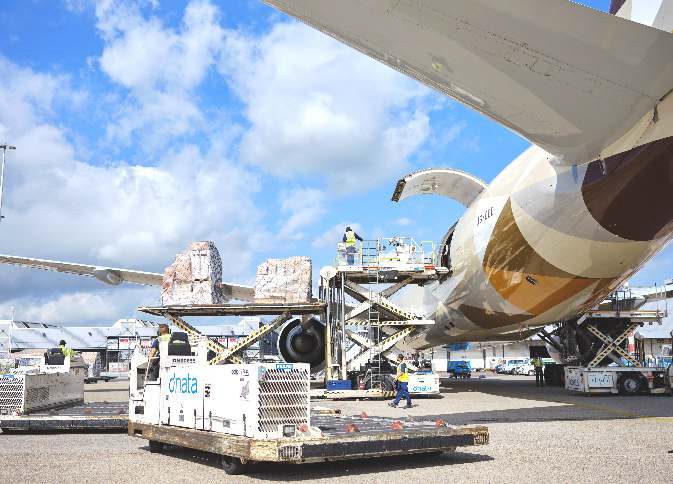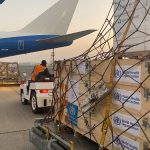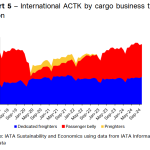Schiphol Airport A nexus of innovations and collaborations
“Schiphol Airport is more than just a hub. It’s a nexus of innovation and collaboration. Our journey is one of continuous evolution, driven by the commitment to excellence.” – Joost van Doesburg, Head of Cargo, Schiphol Airport
Nestled nine kilometers or about 5.6 miles southwest of Amsterdam in the municipality of Haarlemmermeer, Schiphol Airport stands as the Netherlands’ largest airport and ranks third in Europe in terms of passenger traffic.
With an average annual cargo tonnage of 1.74 million, it is also the 4th busiest cargo airport in Europe.
Originally established as a military airbase in 1916, this aviation marvel has transformed into a bustling hub of international travel and commerce. Having opened its gates to civilian aircraft in 1920, Schiphol had since burgeoned into a global juggernaut, welcoming over 72 million passengers in 2019 and facilitating flights to over 320 destinations worldwide.
Within Schiphol’s single terminal building, divided into three departure halls, a tapestry of connectivity is woven. The airport serves as a hub for prominent carriers like KLM Royal Dutch Airlines, Delta Air Lines, United Airlines, and easyJet.
Furthermore, Schiphol Airport’s strategic location and state-of-the-art facilities have established it as a vital player in the global air cargo network. With its cutting-edge cargo handling capabilities and relentless dedication to efficiency, Schiphol contributes significantly to the seamless movement of goods across continents.
Air Cargo Update had the distinct privilege of engaging in a comprehensive dialogue with Joost van Doesburg, the Head of Cargo at Schiphol Airport. This conversation delves into the heart of Schiphol’s remarkable journey, illuminating its evolution into a dynamic air cargo powerhouse, and highlighting the commitment of its leaders to propel the industry forward through innovation and excellence.
A Journey of Transformation
Joost van Doesburg’s journey to becoming the Head of Cargo at Schiphol Airport is one woven with diverse experiences and a deep-rooted commitment to the air cargo industry.
With an impressive background advocating for industrial firms, pharmaceutical companies, and high-tech enterprises within the sector, his path laid the foundation for his current role. His advocacy role extended to optimizing the movement of goods via air cargo, bridging the gap between senders and recipients.
This role, coupled with leadership positions in airline pilot associations and a major general union, provided him with a holistic understanding of the industry’s inner workings, from cleaners to security personnel to handling staff.
Reflecting on his journey, van Doesburg shares, “Shifting my perspective to engage with unions, employees, and shippers directly has been enlightening, It’s like looking at the industry through a different lens. My diverse experiences have equipped me with a holistic understanding of the various stakeholders involved, and I’m excited to contribute to the continued growth and success of this vital sector.”
This journey signifies a commitment to holistic growth, an attribute that has become synonymous with Schiphol Airport’s trajectory.
“Our focus lies on enriching our importance in terms of quality, catering to high-demand and specialized cargo. Our ambition is to remain a pioneering hub that not only stands out for its logistical excellence but also for its unwavering commitment to tailored solutions, making a lasting impact in the cargo landscape for years to come.”
 Smart Cargo Hub: Quality Over Quantity
Smart Cargo Hub: Quality Over Quantity
Schiphol Airport’s transformation from aspiring to be the largest cargo airport in Europe to becoming a smart cargo hub emphasizes a shift from quantity to quality.
The concept emerged as a response to the realization that full capacity had been reached, urging a strategic shift that prioritizes excellence over sheer numbers. “Our approach centers on becoming more intelligent, adaptive, and responsive to industry demands,” van Doesburg explains.
He elaborates, “To achieve this, we made a decisive move two years ago by acquiring the CargoNaut port community system, which is tailored to our specific needs and operations. This system operates neutrally, welcoming collaboration with other IT service providers and creating substantial value for our community. It’s an essential component in our vision of a smarter cargo hub.”
The adoption of the CargoNaut port community system and the substantial investment in the RIT port community system exemplify this shift. The consolidation of cargo activities on one side of the runway, along with the construction of a state-of-the-art cargo facility, signifies a unified cargo city. This move eradicates congestion, streamlines operations, and reduces the overall time taken from door to door.
The commitment to quality extends beyond physical facilities. Schiphol Airport is embracing innovation to refine ground operations, enhance truck accessibility, and provide customs agencies with timely information. Collaborations with the Netherlands Customs reflect a dedication to shaping a future of heightened efficiency and excellence.
Navigating Resource Constraints
Operating at full capacity presents unique challenges, and Schiphol Airport navigates these obstacles with a resolute commitment to cargo operations. By maintaining a baseline level of freighter operations, valuable slots allocated to freighters are preserved, ensuring stability and continuity for operators. “Preserving a baseline level of freighter operations is integral to our strategy,” van Doesburg emphasizes.
He continues, “The well-connected network of destinations serviced by dedicated freighters and cargo holds of passenger aircraft remains a distinctive feature. Schiphol Airport’s commitment to cargo operations ensures stability while catering to both cargo stakeholders and the broader aviation community.”
 Sculpting the Future Infrastructure
Sculpting the Future Infrastructure
Investments in infrastructure are pivotal to Schiphol Airport’s strategic direction. The consolidation of cargo facilities into a centralized cargo city enhances efficiency and collaboration. Initiatives like the “Smart Cargo Main Port” program focus on enhancing information flow within the road feeder network, bolstering the predictability of road feeder services. This provides reliable road transportation alternatives when air solutions are unavailable.
“The ‘Secure Imports’ program underscores our commitment to playing a more integral role in the Netherlands’ economy. We’re placing a greater emphasis on handling high-value goods, including pharmaceuticals and high-tech products. As part of this endeavor, we’re investing in advanced IT solutions designed to enhance security measures,” van Doesburg highlights. “These strategic investments reflect our commitment to innovation, security, and efficiency, positioning Schiphol Airport as a dynamic and secure hub for cargo operations.”
Catering to Diverse Verticals
Schiphol Airport’s diverse offerings encompass various sectors vital to global trade and transportation. “Among these verticals, the flower industry stands as a notable highlight. Schiphol Airport proudly holds the distinction of being Europe’s premier flower hub,” van Doesburg proudly states. “We play a pivotal role in the distribution of flowers across the continent, underscoring our significant contribution to the floral trade.”
He continues, “Additionally, the pharmaceutical and high-tech verticals hold considerable importance in our operations. These sectors demand the utmost precision, security, and efficiency, and we have dedicated resources and capabilities to meet their unique requirements.
“Moreover, we have a focus on high-value goods, which encompasses valuables of various kinds. This vertical reflects our commitment to handling valuable cargo with the highest level of care and security.
“As we look ahead, our strategic vision places emphasis on high-value goods, pharmaceuticals, and high-tech products. These verticals are aligned with our strengths and capacity, enabling us to provide optimal solutions for these critical industries. However, it’s essential to note that our commitment to the flower industry remains unwavering. Even as we evolve and diversify, we continue to nurture our legacy as the flower hub of Europe, ensuring a comprehensive and dynamic cargo portfolio that meets the needs of various industries and trade partners,” he further explained.
Sustainability: A Driving Force
Sustainability has emerged as a paramount concern in the modern world, and Schiphol Airport is at the forefront of adopting sustainable measures. “Undoubtedly, sustainability stands at the forefront of our priorities at Schiphol Airport. As the Netherlands seeks to reduce its environmental impact, we are leading the charge in adopting sustainability measures,” van Doesburg asserted.
He elaborates, “As a state-owned airport, we’re fully committed to becoming a leader not just in terms of quality, but also in terms of sustainability. One of our significant endeavors involves the reduction of noise and NOx emissions. This aligns seamlessly with the government’s directive to enhance sustainability across all sectors. We are the first among airports, but certainly not the last, to embark on this path. This underscores our determination to set a sustainable precedent for the aviation industry.”
“The electrification of our ground equipment is a focal point in minimizing emissions and noise pollution within the airport environment. In terms of air traffic, we’re implementing stringent criteria for freighters that can operate at our airport. We’re prioritizing clean and quiet operations, and we’re actively working towards accommodating only the most environmentally friendly and efficient freighters.”
A Culture of Collaboration
The Smart Hub program embodies Schiphol Airport’s collaborative spirit and its ability to leverage partnerships for innovation. “The essence of the Smart Hub program aligns remarkably well with the collaborative spirit that characterizes the Netherlands,” van Doesburg notes. “Our nation has a rich history of cooperation, dating back centuries to our collective efforts in building protective dikes to combat the challenges of being a country below sea level.”
Schiphol Airport’s geographic advantage and well-connected network have attracted stakeholders who recognize the advantages of the airport’s cooperative approach. “At the heart of this collaboration is Air Cargo Netherlands, an integral entity in our cargo community. This longstanding association comprises all airlines, airports, truckers, handlers, and forwarders. It’s a comprehensive coalition representing the diverse segments of our industry,” he explains. “This unity is a testament to our shared understanding that working together is key to unlocking the potential of a unique logistical solution.”
The Digital Odyssey
Schiphol Airport’s journey into digitalization is a testament to its commitment to innovation and efficiency. “Schiphol Airport has made substantial strides in the digitalization of cargo operations. At the core of our digital transformation is our dedicated port community system,” van Doesburg emphasizes.
“This platform is integral to the cargo ecosystem in the Netherlands, with universal connectivity across the industry. All stakeholders are seamlessly integrated into this system, rendering it an indispensable hub for efficient communication and collaboration.
“We’re resolute in our commitment to minimize paper-based processes within the Dutch cargo landscape,” he continues. “Our journey into digitalization is a testament to our commitment to innovation, efficiency, and environmental responsibility. As we continue to harness the power of technology, we’re shaping a more agile, interconnected, and sustainable cargo ecosystem that sets new benchmarks for the industry.”
E-commerce has become a driving force in cargo operations, and Schiphol Airport is primed to cater to its demands. “E-commerce undeniably represents the future of cargo operations. This surge in e-commerce cargo presents both opportunities and challenges,” van Doesburg notes. “To address this, we’re focused on enhancing our port community system’s capacity to efficiently manage e-commerce data. Our objective is to streamline customs procedures and facilitate seamless processing for e-commerce shipments.”
While e-commerce is a significant vertical, Schiphol Airport’s commitment extends to a comprehensive range of cargo needs.
“Schiphol Airport remains committed to serving a diverse array of cargo needs. Our broad approach distinguishes us from airports that specialize solely in e-commerce, highlighting our commitment to offering a comprehensive range of cargo services that cater to the diverse needs of our industry and community,” said van Doesburg.
Vision for the Future
Looking ahead, Schiphol Airport’s roadmap for the next five years revolves around enriching its importance in terms of quality rather than sheer volume.
“Our focus lies on enriching our importance in terms of quality, catering to high-demand and specialized cargo,” van Doesburg outlines. “Our ambition is to remain a pioneering hub that not only stands out for its logistical excellence but also for its unwavering commitment to tailored solutions, making a lasting impact in the cargo landscape for years to come.”
Van Doesburg’s journey and Schiphol Airport’s evolution mirror a shared commitment to excellence. The emphasis on innovation, collaboration, sustainability, and digitalization forms the bedrock of their strategy.
In a world where adaptability is key, Schiphol Airport’s journey is a testament to its resilience and determination to continue shaping the air cargo landscape for generations to come. With a roadmap focused on delivering exceptional care and attention to cargo, Schiphol Airport’s journey continues to exemplify the spirit of excellence and adaptability in the air cargo industry.














